‘I made my own shroud to avoid pollution during cremation’

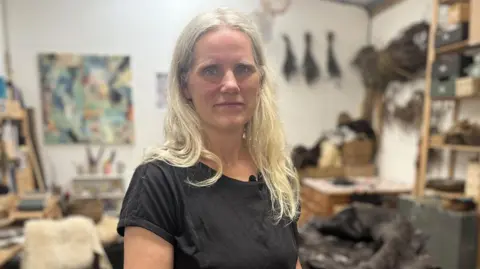 Steel Lizzy/BBC
Steel Lizzy/BBC“I don’t want my last act on this planet to be one of pollution, if I can help it,” explains Rachel Hawthorn.
She is preparing to make her own shroud because she is concerned about the environmental impact of traditional burial and cremation.
“I try very hard in life to recycle and use less and live in an environmentally friendly way, so I want my death to be the same,” she added.
It is estimated that gas cremation produces carbon dioxide emissions equivalent to an estimated return flight from London to Paris, and around 80% of people who die in the UK are cremated each year. a report from carbon consulting firm, Planet Mark.
But traditional burials can also cause pollution. Non-biodegradable coffins are often made with toxic chemicals and bodies are embalmed with formaldehyde: a toxic substance that can leach into the soil.
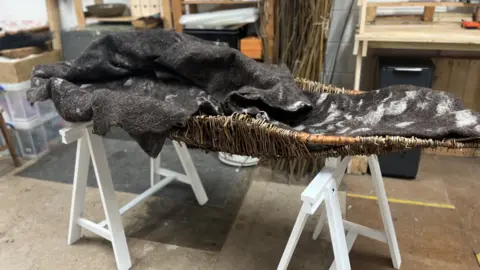 Steel Lizzy/BBC
Steel Lizzy/BBCin one recent survey from Co-op Funeralcare, by YouGov, one in 10 people said they wanted a more ‘eco-friendly’ funeral.
Rachel, from Hebden Bridge, West Yorkshire, made a shroud for a friend from locally sourced wool, willow, brambles and ivy, as part of her work as a an artist.
Over the years, she has explored themes of death, dying, grief and nature through crafts and functional objects.
But the 50-year-old saw the shroud, which could eliminate the need for a coffin, as more than just a work of art – and decided to make her own.
A common reaction from people who have seen this work is to ask if they can touch it and feel how soft it is.
For Rachel, it was the perfect way to help people tackle the taboo subject of death.
She also works as a death doula, which includes assisting those who are dying as well as their loved ones to make informed choices about funeral care.
“I find that when we talk about death, everyone I meet sees it as something that is helpful and healthy, and something that enriches life,” she said.
“When someone dies, it’s often very shocking. We were just getting into the groove of ‘this is going to happen’, so I wanted to open up those conversations.
“I want more people to know that there are options and we don’t have to end up in a box.”
Digging graves to a depth of 1.82 m has been around since the 16th century and was believed to be a preventative measure against the plague.
When Rachel’s time comes, she wants a natural burial, which means using a biodegradable coffin or shroud in a shallower grave. The upper layers of soil contain more active bacteria so a body can decompose in about 20 to 30 years, instead of up to 100 years in a traditional grave.
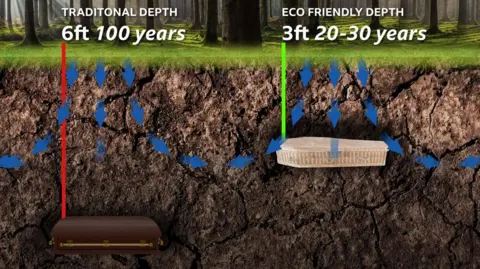
Natural burial sites are scattered across the UK and bear little resemblance to conventional cemeteries – trees and wildflowers replace artificial headstones and no pesticides are used.
Embalming, headstones, decorations and plastic flowers are not allowed.
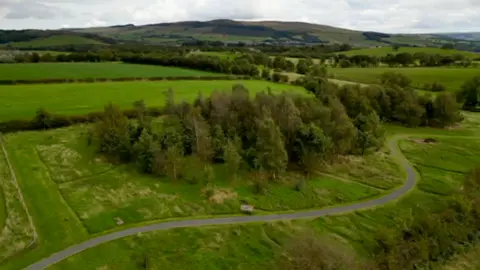
Louise McManus’s mother was buried last year at Tarn Moor Memorial Woodland, a natural site near Skipton. The funeral included an electric hearse, locally made wool coffin and flowers from her garden.
“She loved nature and being outside. She was worried about what was happening to the environment and asked that her funeral be as sustainable as possible,” says Louise.
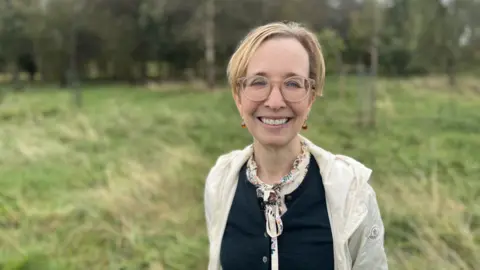
Leeds-based funeral director Sarah Jones, who organized the send-off, said demand for sustainability was growing.
Her business has expanded to four locations since opening in 2016, with an increase in sustainable funeral services helping to fuel that expansion.
She said from a handful of eco-burial services, such requests now make up about 20% of her business.
“More and more people are asking about this issue and want to make better choices for the planet. They often feel it reflects the life of the deceased because it is important to them,” she said.
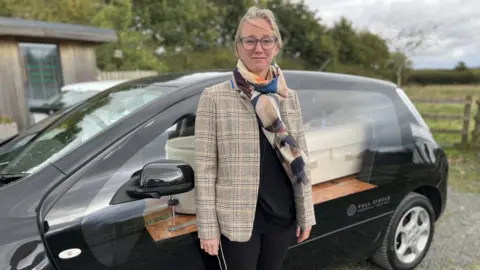 Steel Lizzy/BBC
Steel Lizzy/BBCLike many environmentally friendly industries, natural burial can be more expensive. Many estates, including Tarn Moor, offer cheaper plots of land to local people. One in Speeton, North Yorkshire, is run by the community and puts profits back into the village playground.
At Tarn Moor, a plot of land plus maintenance for Skipton residents costs £1,177. Non-locals pay £1,818. The nearest council cemetery charges £1,200 for a grave while cremation costs here start from £896.
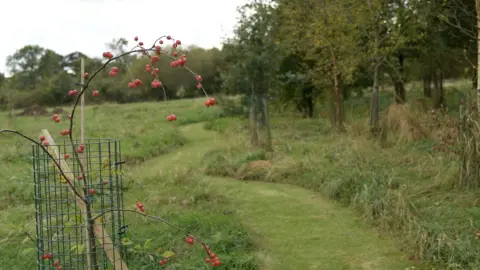
Planet Mark’s report points out that regularly leaving urban areas and transport routes and traveling to natural areas to attend funerals or visit graves can create high carbon emissions. than traditional locations.
Shroud maker Rachel recognizes these challenges but is hopeful for lasting change. She wants to see more natural estates locally and normalize eco-friendly death care, while respecting the choices of others.
“In the past, women used to come to their husband’s house with shrouds as part of their dowry and they would be kept in the bottom drawer until needed,” she said.
“I don’t understand why people couldn’t have the shroud ready and waiting for them.
“I think that can be normal, but everyone needs to make their own choices. It doesn’t have to be a certain way.”





